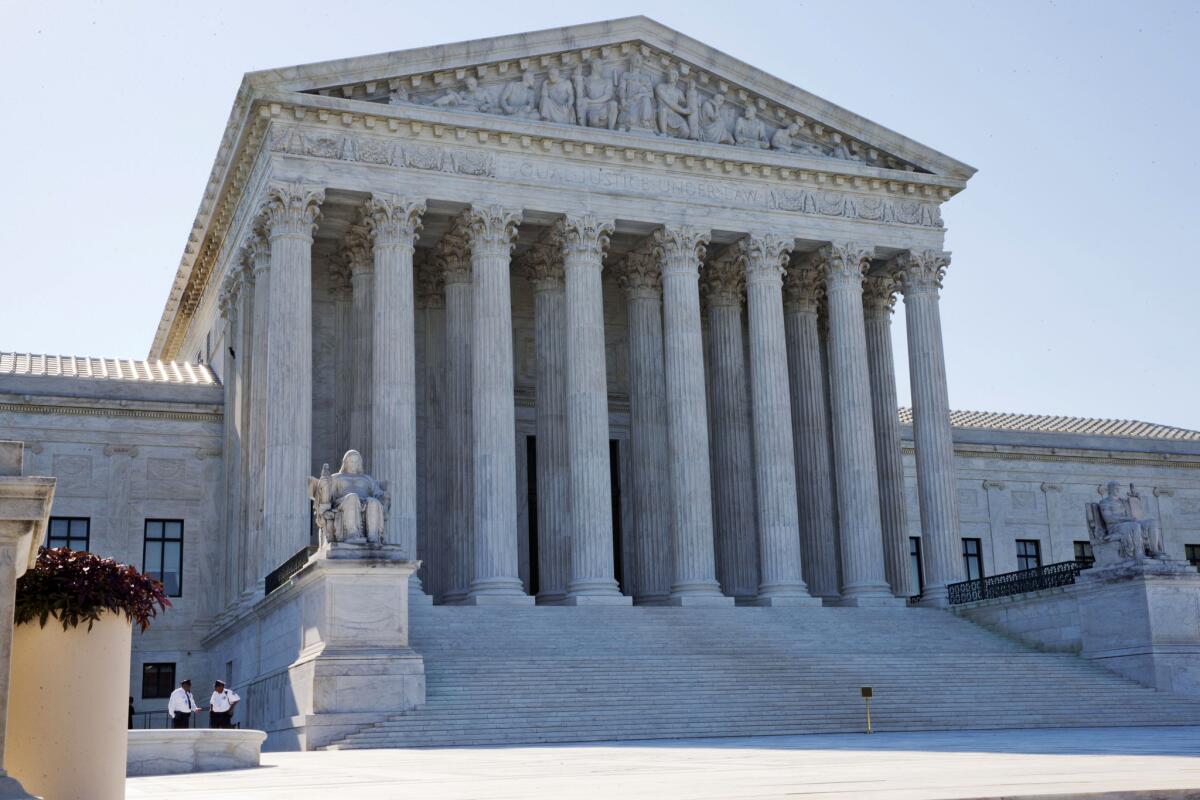Op-Ed: How the idea of religious freedom is being used to undermine other rights

“Religious discrimination.” It’s an accusation we hear with increasing frequency. Indeed, discrimination on the basis of religion is one of the few common concerns our divided society has left. But even here, political polarization has left its mark.
As conservatives use it, “religious discrimination” carries a meaning that is largely lost on the broader public. Now, with three new decisions from the Supreme Court, we can see how that conservative conception of religious discrimination intrudes on some of the most basic principles of the American democratic tradition.
One case decided last week, Espinoza vs. Montana, ruled that a state constitutional provision limiting state-subsidized scholarships only to secular schools “discriminates” against religious schools and the parents who choose them, and thereby violates the Free Exercise Clause of the 1st Amendment.
On Wednesday, the court handed down two more decisions, further eroding principles of religious freedom that require the separation of church and state.
In the case of Our Lady of Guadalupe School vs. Morrissey-Berru, the court dramatically expands the “ministerial exemption,” which protects church autonomy by barring ministers from suing their employers. The court broadened this exemption by classifying any teacher who performs “religious functions” as a “minister,” even if those functions are as minimal as joining children in a religious service or even if the employee is not a
practicing member of the religion governing the school.
The teachers worked at two Los Angeles-based Catholic schools, and their primary responsibility was secular education. They had not undergone religious training, but the schools contended that they should be classified as ministers and claimed that to decide otherwise would “impermissibly discriminate among religions.” The Supreme Court’s decision, without using this language itself, upholds the claim promoted by religious conservatives that requiring religious schools to abide by the principles of anti-discrimination law is itself an act of religious discrimination.
The court supported an even broader version of the conservative view of religious exemptions in another case decided on Wednesday, Little Sisters of the Poor vs. Pennsylvania. This case involves a challenge to the Trump administration’s policy on religious exemptions from the Affordable Care Act’s rules that require employers to provide contraception coverage in employee health plans.
That policy, pushed through by conservatives, deemed the exemption allowed by the Obama-era policy to be discriminatory because it required employers claiming the exemption to go through a simple self-certification process which ensured that employees would continue to receive coverage for contraception. The Trump administration got rid of that process and expanded the exemption to apply to any employer claiming a moral or religious objection to providing contraception coverage in employee health plans.
Although the decision was based on a narrow determination of whether the Trump policy conformed to administrative law requirements for the rule-making process (the court ruled that it did), the consequence of upholding the policy is that between 70,500 to 126,400 women will lose coverage for cost-free contraceptive services.
The results of all three cases support the idea that any law applied to a religious group amounts to unconstitutional “religious discrimination” if the group opposes the law.
But the premise behind this conception is false. There is ample room for disagreement over when religious objections should be accommodated, or whether supplying public funding for religious education on equal terms with nonreligious education is necessary to religious liberty or threatens it. Many conservatives hold that it is necessary. That’s not unreasonable.
But to claim that refusing to provide public funding is discriminatory is specious, as is the claim that progressive policies are discriminatory just because they reject conservative beliefs. These arguments show an inability to distinguish between disagreement and discrimination. Using the democratic process to resolve moral and policy disagreements is not discrimination, so long as every group gets due consideration.
This false view of discrimination has led to a complete reordering of the two key religion clauses of the 1st Amendment. It has diminished the Establishment Clause principle that prohibits state support for religion and has overinflated the Free Exercise Clause by suggesting that people have the right to do anything their religion requires them to do, even if it poses a risk to public health.
The ascendancy of this position represents the culmination of a movement, strongly backed by evangelical Protestants, conservative Catholics and Orthodox Jews, that has been steadily gaining ground over the last several decades.
This movement not only accounts for the Supreme Court’s recent decisions; it also holds the key to President Trump’s unshakable support among religious conservatives. The Trump administration has made the “restoration” of religious liberty and protection from “religious discrimination” a top priority, appointing justices, judges and agency heads who firmly adhere to this point of view.
For religious conservatives, these recent decisions deliver on his promise to protect them from discrimination. For the rest of us, they confuse the notion of religious discrimination, while eroding both the principle of equality and the wall of separation between religion and state.
Nomi Stolzenberg is the Nathan and Lily Shapell Professor at the USC Gould School of Law.
More to Read
A cure for the common opinion
Get thought-provoking perspectives with our weekly newsletter.
You may occasionally receive promotional content from the Los Angeles Times.










